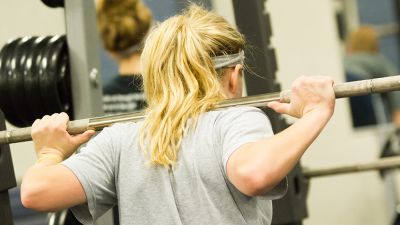
Pre-Occupational Therapy
Occupational therapists help people of all ages fully engage in their daily lives, from their work and recreation to daily activities like getting dressed, cooking, eating and driving. As an occupational therapist, you will use your skills to treat injured, ill or disabled patients, helping them recover and improve the skills they need for daily living.
You may choose to specialize your occupational therapy practice, for instance, working with
- premature babies at a pediatric hospital,
- children with cerebral palsy or Down syndrome,
- older adults in nursing homes,
- accident victims or
- people with mental illnesses.
New specialties for occupational therapists are emerging every day as well, like training office workers to use the correct ergonomics, working with architects and construction companies to make buildings and homes more accessible or helping students in school who have learning disabilities or behavioral problems.
Enhance your patients’ quality of life!
Program Highlights
WHY STUDY PRE-OCCUPATIONAL THERAPY AT CONCORDIA?
The pre-occupational therapy program at Concordia University, Nebraska will help prepare you to continue your education to become a health care professional. Here, you will gain the strong foundation in natural science, psychology, critical thinking and analytical reasoning you will need to excel in a graduate program and as an occupational therapist. Hands-on labs, internship experiences with local healthcare professionals and research opportunities will prepare you on your path to a fulfilling career as an OT.
Accreditation
Concordia University, Nebraska is accredited by the Higher Learning Commission, a regional accreditation agency recognized by the U.S. Department of Education.
Micah Scholars Pre-Health Scholars Program
Micah Pre-Health Scholars is designed to help students be successful in their healthcare vocations through hands-on experiences, community support and graduate or professional school preparation.
Degree Goals
A pre-occupational therapy program graduate from Concordia University, Nebraska will be able to:
- Demonstrate comprehension of key science principles relating to required courses.
- Analyze and evaluate information and identify the need for research to draw conclusions, formulate inferences, solve problems and make decisions.
- Demonstrate information literacy skills by locating, evaluating, selecting, organizing, synthesizing and ethically documenting information from multiple sources using both informal and formal formats, as appropriate for diverse writing situations.
- Learn effective written and oral communication skills.
Career Outcomes
Occupational Therapist
- Help your patients learn to perform daily tasks more efficiently and with greater comfort
- Enhance your patients’ quality of life
FAQs
What are the steps to becoming an occupational therapist?
The first step to becoming an occupational therapist (OT) is to earn a bachelor’s degree. Around the summer before senior year and depending on which OT schools you want to apply for, you may need to take the Graduate Record Examination (GRE). Once accepted to a graduate OT program, you will complete your master's or clinical doctorate and take your certification examination (NBCOT) to be licensed as an Occupational Therapist, Registered, Licensed (OTR/L).
Related Programs

Biology
With a degree in biology from Concordia Nebraska, you will be prepared to begin a career in the biological sciences right away, or to continue your education in graduate, medical, dental or veterinary school. As a biology major at Concordia, you learn essential skills such as time management and mastering complex material, as well as studying more in-depth topics such as microbiology, human anatomy and immunology to give you the knowledge you need to be successful in the field of biology.

Chemistry
A degree in chemistry from Concordia University, Nebraska expands your understanding of general chemistry and gives you the practical, hands-on experience you need to continue a career in chemistry after graduation. Your classroom and chemistry lab experience will help you on your journey to use your passion for chemistry to serve in healthcare, industry, research and more.

Exercise Science
The exercise science program at Concordia University, Nebraska offers you the opportunity to advance your knowledge, skills and abilities while staying current with innovative research by utilizing state-of-the-art human performance laboratory equipment. Here, you will learn how to apply the gifts God has given you to enhance the spiritual, physical, intellectual, emotional and social wellbeing of others.
1 Recent graduates attending graduate school or employed within six months of graduation.